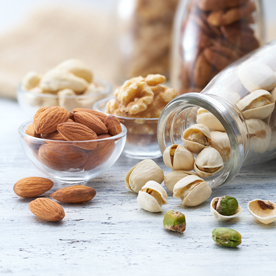
PCOS is a complex, challenging, and full-body endocrine disorder, which increases levels of androgens, also known as ‘male’ hormones. Many experts believe PCOS is closely tied to insulin resistance, which may put women at a greater risk of developing type-2 diabetes.
What is insulin resistance?
In normal circumstances, insulin increases briefly after eating, driving the liver and muscles to take sugar from the blood and use it for energy. From there, blood sugar falls, and then insulin falls. This is classed as healthy insulin sensitivity.
Insulin resistance happens when the body can produce insulin but can’t use it properly. As a result, the pancreas makes more and more insulin to compensate to make sure that your blood glucose level remains within a healthy range.
Insulin resistance PCOS
Around 70 per cent of women with PCOS have insulin resistance (1). High insulin isn’t just a symptom of PCOS; it can also cause the condition.
Insulin resistance often leads to weight gain in women with PCOS. And to complicate matters further, excess weight can cause the body to produce even more insulin.
PCOS and diabetes
Type-2 diabetes occurs when the body becomes resistant to insulin. Increasingly, many experts believe there’s a link between PCOS and diabetes, with research suggesting PCOS insulin resistance is an independent risk factor for developing diabetes (2).
 Type-2 diabetes takes hold gradually, leading to increased hunger and thirst, a dry mouth, frequent urination, fatigue, blurred vision, and headaches (3).
Type-2 diabetes takes hold gradually, leading to increased hunger and thirst, a dry mouth, frequent urination, fatigue, blurred vision, and headaches (3).
How to help prevent type-2 diabetes
Not every woman with PCOS will develop type-2 diabetes. Still, it’s a good idea to live in a healthy, balanced way that may help prevent the condition in the first place.
Weight management
Weight gain is the main driver of type 2 diabetes in women with PCOS. And although PCOS can make weight loss more difficult, losing even a small amount can help to manage symptoms, reduce PCOS insulin resistance, and minimise the risk of type-2 diabetes.
Weight loss doesn’t need to be strict, rigorous, or unsustainable. An integrative approach involving simple changes to your diet and lifestyle can be all it takes for long-lasting results.
Diet
Little tweaks to how, what, and when you eat can help you lose weight with PCOS in a healthy, manageable way.
Stick to complex carbohydrates
Unlike simple carbohydrates, which are broken down quickly and cause blood sugar levels to spike almost immediately, complex carbohydrates are digested more slowly, meaning blood sugar levels rise slowly.
This can help to reduce cravings, maintain a healthy weight, and above all, keep your blood sugar levels balanced.
Building your meals around complex carbohydrates, like brown rice, quinoa, rolled oats, pearl barley, and sweet potatoes will help support your weight loss goals and balance hormonal health.
Equally, try to limit your intake of white rice, pasta and bread, which cause your blood sugar levels to spike, crash, and leave you with even more cravings.
Add more fibre
High-fibre foods slow down digestion and reduce the effect of glucose on the blood, which can improve insulin sensitivity. Eating more fibre also increases feelings of fullness, making them an excellent addition for healthy weight management.
All plant foods are naturally rich in fibre, including fruit, vegetables, nuts, seeds, whole grains, legumes, and beans, so try to add plenty to your meals and snacks.
Limit sugar
Like simple carbohydrates, sugar also triggers an increase in your blood sugar levels, which can lead to weight gain and insulin resistance.
It can be helpful to think of your sugar intake the same way a car utilises petrol: if your energy requirements are high, the sugar is put to good use, providing fuel for your body’s cells.
But when you send sugar into your bloodstream and your body doesn’t need it, you may run into problems: it confuses your pancreas, prompting it to release a disproportionate amount of insulin, which is then stored as fat (4).
A simple place to start is cutting back on sugary snacks, fizzy drinks, and ready meals. Remember, you can enhance meals with spices and citrus fruits as opposed to sugar. Ginger, allspice, cinnamon, nutmeg, lemon and lime all add a healthy, delicious kick to dishes.
Increase protein
Essential for metabolic function and satiety, protein helps reduce cravings and regulates hunger hormones, making it one of the best additions for weight loss (5).
Try to include a protein source – animal (meat, fish, and eggs) or plant-based (quinoa, pulses, beans, tofu, tempeh, nuts, and seeds) – at every meal to keep you full and satisfied.
You can read more about supporting PCOS weight loss here.
Get moving
Alongside good nutrition, regular movement improves insulin sensitivity and supports weight loss if you have PCOS (6).
Cardio workouts, HIIT, and strength training are all great for PCOS, so a combination of all three would be wise.
Most importantly, movement should be fun. Find a sport or activity that excites you and stick to it. It could be belly dancing, dynamic yoga, tennis, or martial arts.
Make a conscious effort to pepper your day with short bursts of activity, too: cycle to work, do some squats while your coffee brews, or take a brisk walk with your colleagues at lunch.
Limit alcohol
Too much alcohol can lead to spikes in blood sugar, worsening insulin resistance, so it’s worth watching your intake.
One study found that heavy consumption of alcohol – defined as three or more drinks per day – increased the risk of diabetes by 43 per cent (7).
According to the NHS, women are advised against drinking more than 14 units of alcohol a week. They also encourage spreading drinking over three days or more. And if you want to cut down, try several drink-free days each week.
Be mindful that 14 units equate to 10 small glasses of low-strength wine and 6 pints of average-strength beer.
How to manage PCOS and diabetes
If you’ve been diagnosed with type-2 diabetes and you have PCOS, don’t worry. Alongside the lifestyle inventions above, there are more active ways to manage the condition with targeted nutritional support.
Myo-inositol
With a similar structure to glucose, myo-inositol plays an important role in the body’s communication with cells. There’s also some evidence to suggest that myo-inositol may improve markers of insulin resistance.
In one study, scientists analysed the metabolic results of taking a combination of myo-inositol and d-chiro-inositol in both men and women with type 2 diabetes (8). The inositols were taken twice a day, alongside traditional diabetic treatment drugs, like metformin. The participants also followed a low GI diet. After just 3 months, those who took the combined inositols saw a marked reduction in their fasting glucose.
We recommend taking 4 grams of powdered myo-inositol daily with water or fruit juice to support healthy blood sugar management.
Cinnamon
Traditionally used to support digestion, cinnamon has become the focal point of research thanks to its blood-sugar balancing properties.
Evidence suggests cinnamon contains active substances that may help regulate blood glucose by imitating insulin in the body (9).
Many people take a high-strength cinnamon supplement to balance energy reserves between meals.
Chromium
An essential trace element, chromium supports the maintenance of normal blood glucose levels. When the body doesn’t have enough chromium, it may lead to glucose intolerance and even insulin resistance (10).
Chromium is generally found in meat and shellfish. But if you want to increase your dietary, we suggest taking a high-strength, well-absorbed chromium supplement that provides 200µg.
Metformin for PCOS treatment
Alongside dietary and lifestyle interventions, metformin is often recommended for PCOS insulin resistance and type-2 diabetes. It reduces the amount of glucose (sugar) the liver releases into the body and helps insulin work more efficiently. In other words, metformin improves insulin sensitivity so the insulin your body produces functions better.
If you’re interested in using metformin to manage your symptoms, have a chat with your GP to discuss a treatment plan.
Find out more
Although PCOS and diabetes are closely linked due to insulin resistance, there are many ways you can help to prevent and manage it with simple lifestyle interventions.
You can find out more about supporting your health with PCOS on our dedicated PCOS health hub. Alternatively, please get in touch with our team of expert Nutrition Advisors, who are on hand to provide free, confidential advice.
References:
-
Stepto NK, Cassar S, Joham AE, Hutchison SK, Harrison CL, Goldstein RF, Teede HJ.. Women with polycystic ovary syndrome have intrinsic insulin resistance on euglycaemic-hyperinsulinaemic clamp. Hum Reprod. 28(3):777-84.
-
Endocrine Society (2019) Researchers reveal link between PCOS, type 2 diabetes, Endocrine Society. Available online: https://www.endocrine.org/news-and-advocacy/news-room/2017/researchers-reveal-link-between-pcos-type-2-diabetes
-
Signs and symptoms of type 2 diabetes (2021) WebMD. Available online: https://www.webmd.com/diabetes/type-2-diabetes-symptoms
-
Stanhope, K.L. (2016). Sugar consumption, metabolic diseases and obesity: the state of the controversy. Crit Rev Clin Lab Sci. 53(1): 52–67.
-
Moon J, Koh G.. Clinical Evidence and Mechanisms of High-Protein Diet-Induced Weight Loss. J Obes Metab Syndr. 29(3):166-173.
-
Patten RK et al., Exercise Interventions in Polycystic Ovary Syndrome: A Systematic Review and Meta-Analysis. Front Physiol. 11:606.
-
Howard, A.A. (2004). Effect of alcohol consumption on diabetes mellitus: a systematic review. The Annals of Internal Medicine. 40(3): 211-9.
-
Pintaudi, B., Di Vieste, G., Bonomo, M. (2016). The Effectiveness of Myo-Inositol and D-Chiro Inositol Treatment in Type 2 Diabetes. Int J Endocrinol.
-
Ranasinghe, P., et al. (2012 Jul). Efficacy and safety of “true” cinnamon (Cinnamomum zeylanicum) as a pharmaceutical agent in diabetes: a systematic review and meta-analysis. Diabet Med. 29(12):1480–92.
-
Havel PJ., A scientific review: the role of chromium in insulin resistance. Diabetes Educ. Suppl:2-14.
Related Posts?
Disclaimer: The information presented by Nature's Best is for informational purposes only. It is based on scientific studies (human, animal, or in vitro), clinical experience, or traditional usage as cited in each article. The results reported may not necessarily occur in all individuals. Self-treatment is not recommended for life-threatening conditions that require medical treatment under a doctor's care. For many of the conditions discussed, treatment with prescription or over the counter medication is also available. Consult your doctor, practitioner, and/or pharmacist for any health problem and before using any supplements or before making any changes in prescribed medications.

Olivia
Olivia Salter has always been an avid health nut. After graduating from the University of Bristol, she began working for a nutritional consultancy where she discovered her passion for all things wellness-related. There, she executed much of the company’s content marketing strategy and found her niche in health writing, publishing articles in Women’s Health, Mind Body Green, Thrive and Psychologies.
View More



